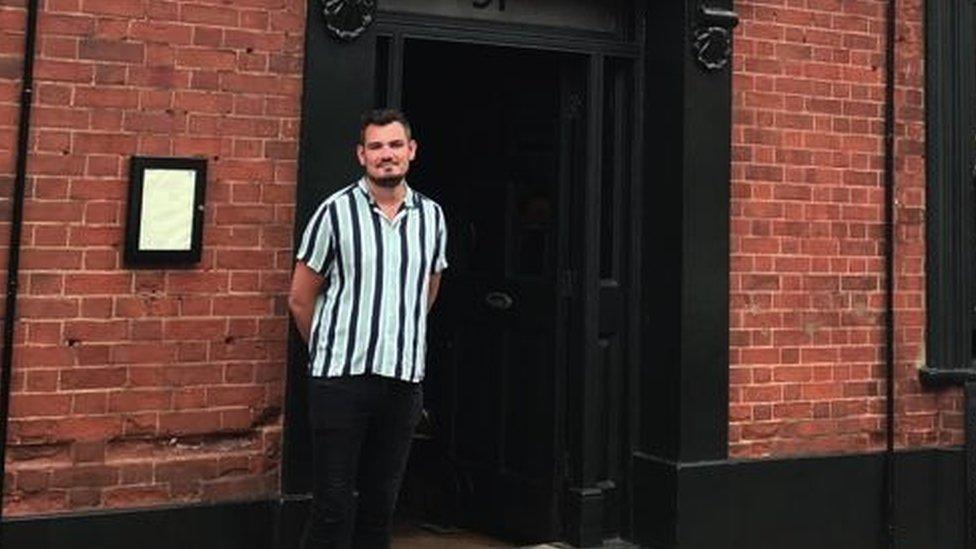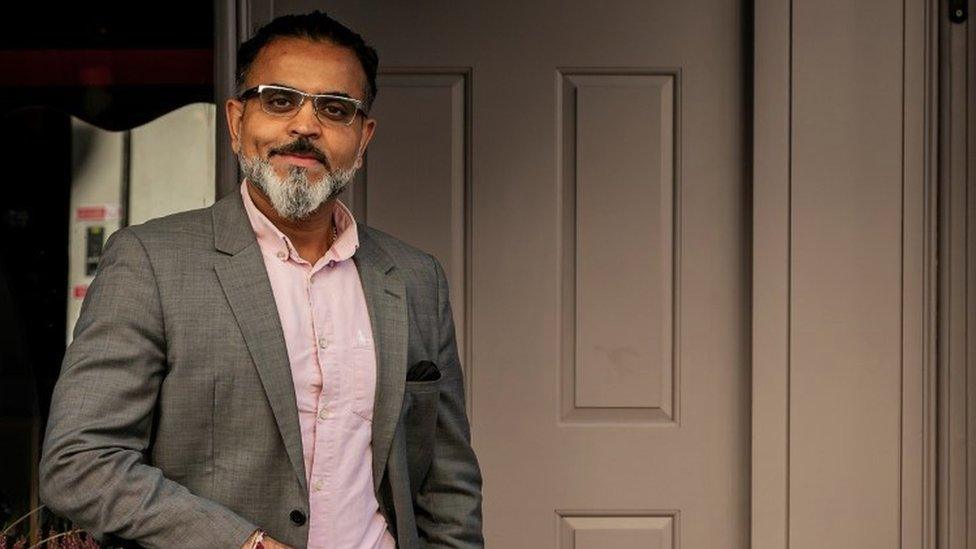Train and Tube strikes: Salon owner says strikes make it feel like the pandemic
- Published

Katie White runs an east London salon
Katie White estimates she lost £1,000 at her salon on Friday - with another £500 to be lost on Saturday - because of the ongoing transport strikes.
Re:lax in Bethnal Green, east London, is normally fully booked at weekends, she says.
But this week's walkouts on trains, buses and Tubes have prompted a wave of cancellations unlike anything Katie has seen since the pandemic first began in 2020.
"We are always fully booked no matter what," the 32-year-old says.
"I was a bit naïve, I did not think it was going to be that bad, but it is like the pandemic times - akin to January 2020 when the cancellations starting coming in ahead of lockdown."
It was Friday's Tube strikes which proved to be a "nightmare" for Katie and her team, with cancellations from around a third of her customers, leading to estimated losses of £1,000.
She has taken the decision to offer discounts to draw customers in - something she has "never had to do across the weekend".
"I am sure that everybody is striking for a good reason in their viewpoint, but we still have massive overheads to pay," she says.
"We are trying to make the best possible situation, but with this, and the cost of living, it does make the team feel anxious and scared."
It has been a summer of industrial action.
The unions are in dispute with the government and rail companies about pay, job cuts and changes to terms and conditions.
London Underground and Overground staff were taking part in a strike on Friday, with some bus services affected too on Friday as well as Saturday, due to a strike called by the Unite union.
Members of the Rail, Maritime and Transport Workers Union (RMT) and the Transport Salaried Staffs' Association (TSSA) are taking part in a strike on Saturday, following action on Thursday, which will affect train lines. Members of the Unite union who work for Network Rail are also striking on Saturday.
RMT leader Mick Lynch said on Friday he is "very sorry" that people are being inconvenienced but defended the action, saying the union has to show it is "deadly serious".

Elliot Smith says there is "not an awful lot" that can be done about the disruption
Elliot Smith, manager at The Rose hotel in Deal, says all local businesses were being hit because the Kent town is on a high-speed rail line bringing customers from London.
"The town in general is badly affected," he says, admitting that his hotel is "extremely lucky" to still be busy. "It affects walk-ins, people down for the weekend.
"It's one of those things you cannot do an awful lot about. It's a pain to drive to - 70% of our clientele come on the train. If this was the down season, in November, it would impact us so much because we do rely on people coming down from London."
He says it is currently the busiest time of the year but during the last strike, the hotel was only half-full on a Saturday - it usually has a two-week waiting list.
Mr Smith adds that when there is industrial action, "it is just not a bustling high street" in Deal. Another possible factor, he said, is that this is the first time in recent years people have been able to go abroad on holiday.
'Bearing the brunt'
Abhi Sangwan, co-owner of London restaurants Kutir and Manthan, says his industry is yet to return to how it was before Covid. Added to this, people are more geared up to working from home - so the strikes mean they are more likely to choose local restaurants if they're eating out.
"More and more, central London restaurants are bearing the brunt," he says.
The strikes this weekend have seen a rise in last-minute cancellations, says Abhi, noting that visitors to London may have been previously unaware of the industrial action.

Abhi Sangwan: People are "sceptical" about booking ahead now in case of further action
Then there is also the issue of staff getting into work, with his restaurants paying for petrol for those who can drive, or arranging cabs for others - as well as delays in supplies being delivered, with road networks busier than usual during strikes.
He says he understands if there are strikes "every now and then" but if they are much more frequent it becomes more of an issue.
People are "sceptical" about booking ahead now in case of further action, adds Abhi, who said covers for Friday were 15-20% down from a usual day.
'Swings and roundabouts'
But one London restaurant owner says staff and customers are adapting to this week's transport disruption.
Ed Thaw, who owns Leroy restaurant in Shoreditch, says they were busier on Wednesday because customers knew that three days of reduced services due to strikes were ahead of them.
"It's kind of swings and roundabouts but by and large we're kind of getting to where we want to be across the week," he says.
"It's not ideal, if it keeps on happening then at some point it's going to be a problem."
Dee Corsi of the New West End Company - which represents 150,000 employees working in London's West End in retail, hotels, hospitality, property and galleries - said this weekend's weather should have seen an influx of tourists from across the UK and abroad. "But instead, trading will once again be hampered by the latest rail and Tube strikes," she said.
Tony Sophoclides, UK Hospitality strategic affairs director, says the timing of the action "could not be much worse".
The sector is already struggling with staff vacancies- thought to be around 173,000 - and is still slowly recovering from the fallout of the pandemic, he adds.
Speaking from a pub in central London which he says has been affected by no-shows, Tony adds: "It is a mixed picture but it is all pretty bleak.
"We are struggling with energy prices at the same time as the cost of living crisis, which means discretionary spend is being squeezed."
He said the timing of the strike was "really unfortunate" and that he hoped it would "be sorted out by all parties" soon.
Related topics
- Published9 May 2024
